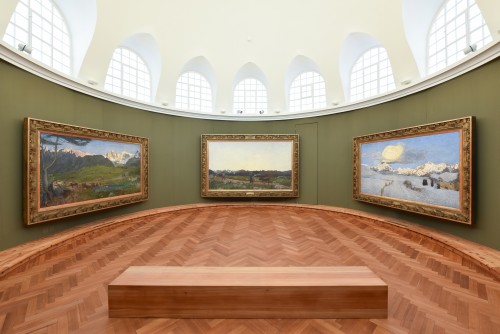The Segantini Museum houses the most extensive and important collection of works by Giovanni Segantini, the great symbolist and innovator of Alpine painting.
The extraordinary esteem in which Segantini and his art were held in Europe manifested itself not least in the construction of a museum dedicated to him. The Segantini Museum was opened in St. Moritz in 1908, nine years after the artist's death. The architecture by Nicolaus Hartmann was based on the monumental pavilion that the artist had designed for his Engadin panorama for the Paris World Exhibition (1900). The circular building with its mighty dome has the appearance of a mausoleum and looks like a walk-in monument.
Segantini Museum, St. Moritz

The domed hall with the triptych "Life – Nature – Death" by Giovanni Segantini
Permanent Exhibition
The collection, which has reached a considerable size with 37 paintings, is complemented by a collection of 26 drawings that is unparalleled in its scope and quality. Highlights of the collection are the monumental alpine triptych "Life - Nature - Death" and the famous paintings "Hail Mary at Transshipment" and "Noon in the Alps".
During the summer season (20 May — 20 October 2025), visitors will be able to admire Segantini's great masterpieces, as well as rarely exhibited still lifes by the artist.
 Giovanni Segantini, «Mittag in den Alpen», 1891, ©Stephan Schenk
Giovanni Segantini, «Mittag in den Alpen», 1891, ©Stephan Schenk Giovanni Segantini, «Ave Maria crossing the lake», 1886, ©Stephan Schenk
Giovanni Segantini, «Ave Maria crossing the lake», 1886, ©Stephan Schenk Exhibition space at the Segantini Museum, ©Stephan Schenk
Exhibition space at the Segantini Museum, ©Stephan SchenkEvents
Guided tours
On request all year round in German, English, Italian.